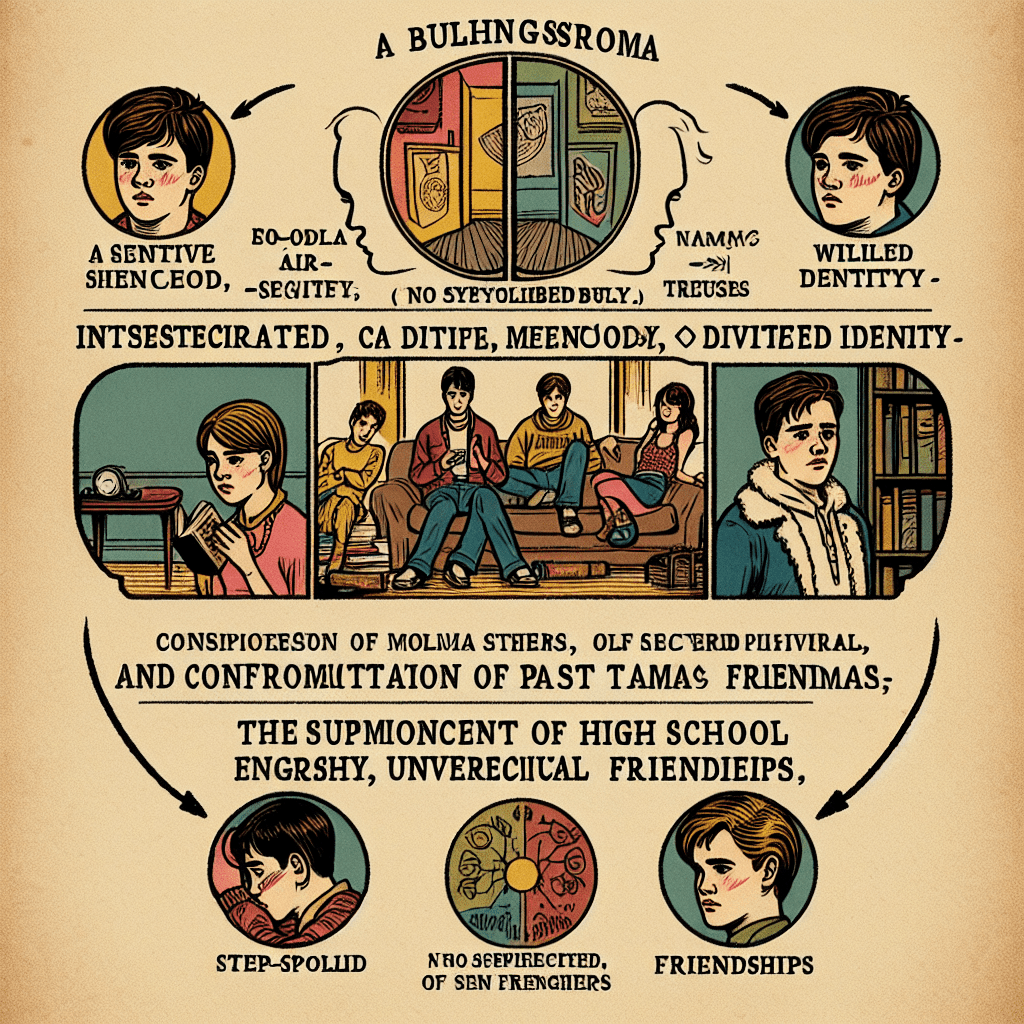-
Table of Contents
“Discover the journey of self-discovery, friendship, and the struggles of adolescence in ‘The Perks of Being a Wallflower’.”
“The Perks of Being a Wallflower,” written by Stephen Chbosky, is a coming-of-age novel that follows the life of Charlie, an introverted high school freshman navigating the complexities of adolescence. Through a series of letters addressed to an anonymous friend, Charlie shares his experiences with friendship, love, trauma, and self-discovery. The novel explores themes such as the struggles of mental health, the importance of connection, and the impact of past experiences on personal growth. Key characters include Charlie, his friends Sam and Patrick, and his family, each contributing to the rich tapestry of Charlie’s journey toward understanding himself and the world around him. The book’s poignant narrative and relatable themes resonate with readers, making it a significant work in contemporary literature.
Summary of The Perks of Being a Wallflower
“The Perks of Being a Wallflower,” a novel by Stephen Chbosky, unfolds through a series of letters written by the protagonist, Charlie, a high school freshman navigating the complexities of adolescence. The narrative begins with Charlie’s reflections on his life, marked by the recent loss of his best friend to suicide. This event leaves him feeling isolated and vulnerable, as he grapples with his emotions and the challenges of fitting in. Through his letters, Charlie shares his experiences, thoughts, and feelings, providing readers with an intimate glimpse into his psyche.
As the story progresses, Charlie befriends two seniors, Patrick and his stepsister Sam, who introduce him to a world of friendship, love, and self-discovery. Their dynamic becomes a pivotal aspect of the narrative, as they help Charlie break free from his shell and experience the joys and pains of teenage life. The trio engages in various activities, from attending parties to exploring the complexities of romantic relationships, which serve to highlight the themes of acceptance and belonging. Charlie’s journey is not without its struggles; he confronts issues such as mental health, trauma, and the impact of family dynamics on his sense of self.
Throughout the novel, Charlie’s letters reveal his introspective nature and his desire to understand the world around him. He often reflects on the significance of moments, emphasizing the importance of being present and cherishing experiences. This theme of mindfulness resonates deeply, as Charlie learns to appreciate the beauty in both the highs and lows of life. His relationships with Patrick and Sam become instrumental in his growth, as they encourage him to embrace his identity and confront his past.
Moreover, the novel delves into the complexities of love and friendship. Charlie’s infatuation with Sam introduces him to the bittersweet nature of unrequited love, while his bond with Patrick showcases the importance of loyalty and support among friends. These relationships are not merely superficial; they challenge Charlie to confront his insecurities and fears, ultimately leading him toward a greater understanding of himself and his place in the world.
As the narrative unfolds, Charlie’s mental health becomes a central focus. He experiences moments of intense anxiety and depression, which are exacerbated by his traumatic past. The novel does not shy away from addressing these issues, instead portraying them with sensitivity and realism. Through therapy and the support of his friends, Charlie begins to unravel the complexities of his emotions, illustrating the importance of seeking help and fostering open conversations about mental health.
In conclusion, “The Perks of Being a Wallflower” is a poignant exploration of the trials and tribulations of adolescence. Through Charlie’s letters, readers are invited to witness his journey of self-discovery, marked by the themes of friendship, love, and the struggle for acceptance. The novel’s rich character development and emotional depth resonate with anyone who has ever felt like an outsider, making it a timeless coming-of-age story. Ultimately, Charlie’s experiences serve as a reminder of the importance of connection and the transformative power of understanding oneself and others.
Exploration of Major Themes in the Novel
“The Perks of Being a Wallflower,” a poignant coming-of-age novel by Stephen Chbosky, delves into a myriad of themes that resonate deeply with readers, particularly those navigating the tumultuous landscape of adolescence. One of the most prominent themes is the struggle for identity. The protagonist, Charlie, embarks on a journey of self-discovery, grappling with his past traumas and the complexities of his emotions. As he navigates high school, he encounters various influences that shape his understanding of who he is and who he aspires to be. This exploration of identity is not merely a personal quest; it reflects the universal challenge faced by many teenagers as they seek to define themselves amidst societal expectations and peer pressures.
Another significant theme is the importance of friendship and connection. Throughout the novel, Charlie forms deep bonds with his friends, Sam and Patrick, who introduce him to new experiences and perspectives. These relationships serve as a lifeline for Charlie, providing him with a sense of belonging that he desperately craves. The novel illustrates how friendships can be both a source of joy and a catalyst for personal growth. As Charlie learns to navigate the complexities of these relationships, he also confronts the pain of loss and betrayal, highlighting the dual nature of human connections. This theme underscores the idea that while friendships can uplift us, they can also challenge us to confront our vulnerabilities.
Moreover, the theme of mental health is intricately woven into the narrative. Charlie’s struggles with depression and anxiety are depicted with sensitivity and realism, shedding light on the often-taboo subject of mental illness. Through Charlie’s letters, readers gain insight into his internal battles, which are exacerbated by his traumatic experiences. The novel emphasizes the importance of seeking help and the impact of supportive relationships on mental well-being. By addressing mental health openly, Chbosky encourages readers to engage in conversations about their own struggles, fostering a sense of empathy and understanding.
Additionally, the theme of love—both romantic and platonic—plays a crucial role in the story. Charlie’s infatuation with Sam illustrates the complexities of young love, characterized by longing, confusion, and the bittersweet nature of unrequited feelings. This exploration of love extends beyond romantic interests, as Charlie learns to appreciate the love and support of his friends and family. The novel suggests that love, in its many forms, is a powerful force that can inspire growth and healing, even in the face of adversity.
Furthermore, the theme of nostalgia permeates the narrative, as Charlie reflects on his experiences and the passage of time. The act of writing letters serves as a means for him to process his memories, both joyful and painful. This reflective quality invites readers to consider their own experiences and the ways in which they shape their identities. The bittersweet nature of nostalgia is evident as Charlie grapples with the fleeting nature of youth and the inevitability of change.
In conclusion, “The Perks of Being a Wallflower” masterfully explores themes of identity, friendship, mental health, love, and nostalgia, creating a rich tapestry that resonates with readers of all ages. Through Charlie’s journey, Chbosky invites us to reflect on our own experiences and the connections that shape our lives, ultimately reminding us of the beauty and complexity of the human experience.
Character Analysis of Charlie
In Stephen Chbosky’s novel “The Perks of Being a Wallflower,” the protagonist, Charlie, serves as a poignant lens through which readers explore the complexities of adolescence, mental health, and the quest for identity. As an introspective and sensitive teenager, Charlie embodies the struggles of many young individuals navigating the tumultuous waters of high school life. His character is marked by a profound sense of observation, which allows him to perceive the world around him with a depth that often eludes his peers. This quality not only sets him apart but also positions him as a quintessential “wallflower,” someone who observes rather than participates, reflecting a broader commentary on the nature of social dynamics during adolescence.
Charlie’s journey is significantly shaped by his experiences with trauma and loss. The novel opens with him grappling with the recent suicide of his best friend, Michael, an event that leaves an indelible mark on his psyche. This loss catalyzes Charlie’s emotional struggles, leading him to confront feelings of isolation and confusion. As he navigates his freshman year, he is haunted by memories and feelings that he cannot fully articulate, which adds layers to his character. His letters, written to an anonymous friend, serve as a narrative device that reveals his innermost thoughts and feelings, allowing readers to witness his vulnerabilities and fears. Through these letters, Charlie’s character evolves, illustrating his desire for connection and understanding in a world that often feels alienating.
Moreover, Charlie’s relationships with other characters play a crucial role in his development. His friendship with Patrick and Sam introduces him to a new social circle that challenges his previous notions of friendship and acceptance. Patrick, with his exuberant personality, and Sam, with her warmth and kindness, become pivotal figures in Charlie’s life, helping him to break out of his shell. Their influence encourages him to embrace new experiences, from attending parties to exploring romantic feelings. However, these relationships also expose Charlie to the complexities of love, heartbreak, and the pressures of conformity, further complicating his emotional landscape. As he navigates these dynamics, Charlie’s character reflects the universal struggle of finding one’s place in a world that often feels overwhelming.
In addition to his relationships, Charlie’s introspection leads him to confront deeper issues related to mental health. Throughout the novel, he grapples with anxiety and depression, which manifest in various ways, including panic attacks and feelings of detachment. His experiences highlight the importance of mental health awareness, particularly among adolescents who may feel stigmatized or misunderstood. Charlie’s journey toward healing is gradual and fraught with setbacks, yet it underscores the significance of seeking help and the power of vulnerability. His eventual acceptance of his mental health challenges serves as a testament to resilience and the importance of self-acceptance.
Ultimately, Charlie’s character encapsulates the essence of adolescence—marked by confusion, growth, and the search for belonging. Through his experiences, readers are invited to reflect on their own journeys and the myriad factors that shape their identities. As he learns to navigate the complexities of friendship, love, and loss, Charlie emerges as a relatable and enduring figure, reminding us of the beauty and pain inherent in the process of growing up. In this way, “The Perks of Being a Wallflower” not only tells Charlie’s story but also resonates with anyone who has ever felt like an outsider in their own life.
The Role of Friendship in The Perks of Being a Wallflower
In Stephen Chbosky’s novel “The Perks of Being a Wallflower,” the theme of friendship emerges as a pivotal element that shapes the protagonist’s journey through adolescence. The narrative, presented through a series of letters written by Charlie, a sensitive and introspective high school freshman, explores the complexities of human relationships and the profound impact they have on personal growth. As Charlie navigates the tumultuous waters of teenage life, the friendships he forms become both a source of solace and a catalyst for self-discovery.
Initially, Charlie grapples with feelings of isolation and alienation, stemming from the trauma of losing his best friend to suicide and the challenges of fitting into a new social environment. However, his life takes a transformative turn when he befriends step-siblings Patrick and Sam, who introduce him to a world filled with acceptance, joy, and the exhilarating experiences of youth. Through these friendships, Charlie learns the importance of vulnerability and the strength that comes from opening oneself to others. Patrick, with his charismatic and outgoing personality, serves as a guiding force, encouraging Charlie to embrace his true self and to step outside his comfort zone. This dynamic illustrates how friendships can provide a safe space for individuals to explore their identities and confront their fears.
Moreover, the novel delves into the complexities of friendship, highlighting both its uplifting and challenging aspects. As Charlie becomes more integrated into Patrick and Sam’s circle, he experiences the highs of camaraderie, such as shared laughter, late-night conversations, and the thrill of first love. However, the narrative also addresses the darker side of friendships, including jealousy, heartbreak, and the inevitable conflicts that arise as individuals grow and change. For instance, Charlie’s feelings for Sam complicate their friendship, leading to moments of tension and confusion. This exploration of the multifaceted nature of friendship underscores the idea that relationships are not always straightforward; they require effort, understanding, and sometimes, sacrifice.
Furthermore, the role of friendship in “The Perks of Being a Wallflower” extends beyond mere companionship; it serves as a vehicle for healing and personal growth. Throughout the story, Charlie grapples with his mental health, confronting the shadows of his past and the emotional scars that linger. His friends play a crucial role in this process, providing support and encouragement as he navigates his struggles. The unconditional love and acceptance he receives from Patrick and Sam empower him to confront his demons, ultimately leading to a greater understanding of himself and his place in the world. This theme resonates with readers, emphasizing the idea that true friends can help illuminate the path toward healing and self-acceptance.
In conclusion, the role of friendship in “The Perks of Being a Wallflower” is integral to the narrative, serving as both a source of joy and a means of personal growth for Charlie. Through his relationships with Patrick and Sam, he learns valuable lessons about vulnerability, acceptance, and the complexities of human connection. The novel poignantly illustrates that while friendships can be fraught with challenges, they also possess the power to heal and transform, ultimately shaping the individuals we become. As readers journey alongside Charlie, they are reminded of the profound impact that friendships can have on our lives, particularly during the formative years of adolescence.
The Impact of Mental Health on Characters
In “The Perks of Being a Wallflower,” Stephen Chbosky intricately weaves the theme of mental health into the lives of his characters, illustrating how their struggles shape their identities and relationships. The protagonist, Charlie, serves as a poignant lens through which readers can explore the complexities of mental health. As a sensitive and introspective teenager, Charlie grapples with the aftermath of trauma, which manifests in his experiences of depression and anxiety. His journey through high school is marked by a profound sense of isolation, a feeling that resonates with many adolescents who find themselves navigating the tumultuous waters of adolescence.
Charlie’s mental health issues are compounded by the loss of his best friend, Michael, who took his own life. This event leaves an indelible mark on Charlie, leading him to question his own worth and the nature of friendship. The narrative reveals how grief can profoundly affect one’s mental state, often leading to feelings of guilt and confusion. As Charlie attempts to process his emotions, he becomes increasingly withdrawn, illustrating how mental health struggles can create barriers to social interaction and self-expression. This isolation is further exacerbated by his inability to articulate his feelings, a common challenge for those dealing with mental health issues.
Moreover, the characters surrounding Charlie also reflect various aspects of mental health. For instance, his friend Patrick grapples with his own challenges, including the complexities of his sexual identity and the emotional turmoil that accompanies it. Patrick’s vibrant personality often masks his internal struggles, highlighting the theme that individuals may present a façade to the world while concealing their true feelings. This duality is a critical aspect of mental health, as it underscores the importance of understanding that outward appearances do not always reflect inner realities.
Additionally, Sam, another key character, embodies the theme of healing and resilience. Her relationship with Charlie serves as a catalyst for his growth, demonstrating how supportive friendships can play a crucial role in mental health recovery. Through their bond, Charlie begins to confront his past traumas, illustrating the therapeutic power of connection and understanding. Sam’s character also emphasizes the importance of self-acceptance and the journey toward emotional well-being, as she navigates her own insecurities and aspirations.
The novel also addresses the stigma surrounding mental health, particularly through Charlie’s experiences with therapy. His sessions with his therapist provide a safe space for him to explore his feelings and confront his past, emphasizing the significance of seeking help. This portrayal serves to normalize the conversation around mental health, encouraging readers to recognize the value of professional support in overcoming personal struggles.
In conclusion, “The Perks of Being a Wallflower” offers a profound exploration of mental health through its richly developed characters. By delving into the intricacies of Charlie’s experiences, as well as those of Patrick and Sam, Chbosky highlights the multifaceted nature of mental health issues and the importance of empathy and understanding. The narrative ultimately conveys a message of hope, illustrating that while mental health challenges can be daunting, the journey toward healing is possible through connection, support, and self-discovery. Through this lens, readers are invited to reflect on their own experiences and the significance of mental health in their lives and the lives of those around them.
Coming-of-Age Journey in the Story
“The Perks of Being a Wallflower,” a novel by Stephen Chbosky, intricately weaves the coming-of-age journey of its protagonist, Charlie, into a rich tapestry of emotional experiences and personal growth. Set against the backdrop of the early 1990s, the narrative unfolds through a series of letters written by Charlie to an anonymous friend, allowing readers to delve deeply into his thoughts and feelings. This epistolary format not only provides an intimate glimpse into Charlie’s psyche but also serves as a vehicle for exploring the complexities of adolescence, identity, and the quest for belonging.
As the story progresses, Charlie navigates the tumultuous waters of high school, where he grapples with the challenges of friendship, love, and loss. His initial struggles with social anxiety and feelings of isolation are palpable, reflecting the universal experience of many adolescents who feel like outsiders. However, it is through his relationships with his new friends, Sam and Patrick, that Charlie begins to emerge from his shell. Their acceptance and encouragement play a pivotal role in his transformation, illustrating the profound impact that friendship can have during formative years. This dynamic highlights a central theme of the novel: the importance of connection in overcoming personal struggles.
Moreover, Charlie’s journey is marked by moments of self-discovery that resonate with readers. As he becomes more involved in the lives of Sam and Patrick, he learns to embrace his emotions and confront his past traumas. The exploration of his feelings for Sam, in particular, serves as a catalyst for his growth. Through these experiences, Charlie begins to understand the complexities of love and the bittersweet nature of relationships. This theme of love, both romantic and platonic, underscores the idea that coming of age is not merely about growing older but also about developing a deeper understanding of oneself and others.
In addition to friendship and love, the novel delves into the theme of mental health, which is intricately woven into Charlie’s coming-of-age narrative. His struggles with depression and the lingering effects of childhood trauma are portrayed with sensitivity and realism. As Charlie confronts these issues, he learns the importance of seeking help and the value of vulnerability. This aspect of the story not only adds depth to Charlie’s character but also serves as a poignant reminder of the challenges many young people face in their journey toward adulthood. By addressing mental health openly, Chbosky encourages readers to engage in conversations about these critical issues, fostering a sense of empathy and understanding.
Furthermore, the novel captures the essence of adolescence through its exploration of identity. Charlie’s journey is not just about overcoming obstacles; it is also about discovering who he is in the midst of societal expectations and peer pressure. As he navigates the complexities of his relationships and confronts his fears, he begins to carve out his own identity, ultimately embracing his uniqueness. This theme resonates with readers, as it reflects the universal struggle of finding one’s place in the world.
In conclusion, “The Perks of Being a Wallflower” masterfully encapsulates the coming-of-age journey through Charlie’s experiences, relationships, and personal growth. The novel’s exploration of friendship, love, mental health, and identity creates a rich narrative that speaks to the heart of adolescence. As readers accompany Charlie on his path to self-discovery, they are reminded of the transformative power of connection and the importance of embracing one’s true self. Through its poignant storytelling, the novel continues to resonate with audiences, making it a timeless exploration of the complexities of growing up.
Q&A
1. **What is the main premise of “The Perks of Being a Wallflower”?**
The novel follows Charlie, a socially awkward high school freshman, as he navigates the challenges of adolescence, friendship, love, and mental health through a series of letters to an anonymous friend.
2. **What are the key themes in the book?**
Major themes include the struggles of growing up, the importance of friendship, the impact of trauma, mental health awareness, and the search for identity.
3. **Who are the main characters in the story?**
The main characters include Charlie, the introspective protagonist; Sam, his love interest and a free-spirited senior; Patrick, Sam’s stepbrother and Charlie’s close friend; and Charlie’s family, who play a significant role in his emotional development.
4. **How does Charlie’s mental health affect his experiences?**
Charlie’s struggles with depression and anxiety shape his interactions and relationships, influencing his perception of events and his ability to connect with others.
5. **What role does friendship play in Charlie’s life?**
Friendship is crucial for Charlie’s growth; it provides him with support, acceptance, and a sense of belonging, helping him to confront his past and develop his identity.
6. **What is the significance of the title “The Perks of Being a Wallflower”?**
The title reflects the idea of being an observer in life, highlighting the benefits of being a wallflower, such as gaining insight into the lives of others while also addressing the loneliness and isolation that can accompany it.”The Perks of Being a Wallflower” explores the complexities of adolescence through the eyes of Charlie, a sensitive and introspective teenager navigating the challenges of high school, friendship, and mental health. Key themes include the struggles of identity, the impact of trauma, the importance of connection, and the journey toward self-acceptance. The characters, including Charlie, his friends Sam and Patrick, and others, each represent different facets of teenage life, highlighting the significance of support and understanding in overcoming personal struggles. Ultimately, the novel emphasizes the importance of embracing one’s experiences and the transformative power of love and friendship in the journey of growing up.




